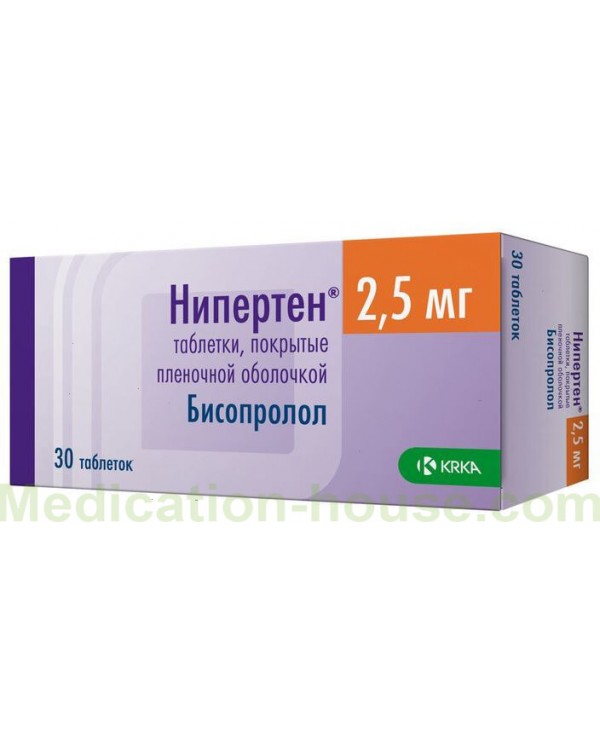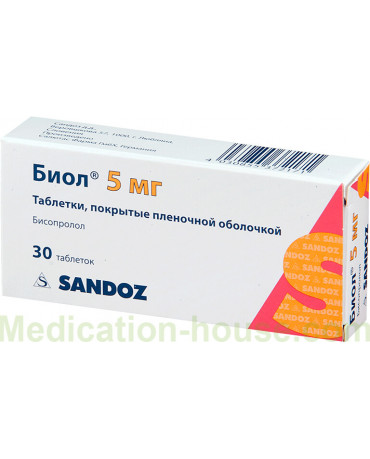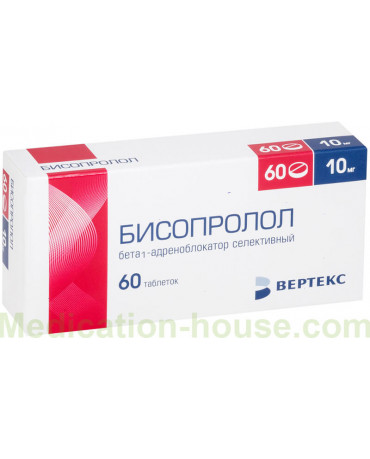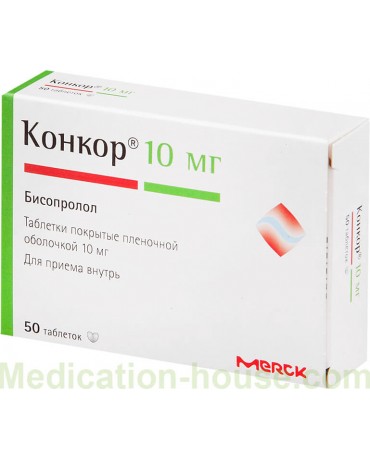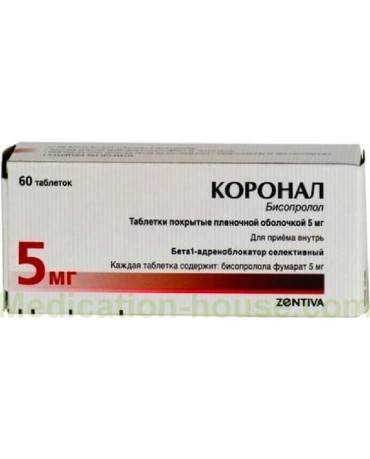Instruction for Niperten
Reed more and buy Niperten here
Niperten is a selective beta1-blocker.
Release form and composition
Niperten is available in the form of film-coated tablets: white, biconvex, with a dividing line on one side; 2.5 mg - oval, 5 mg and 10 mg - round; the core of the tablet when broken is a mass with a rough structure of almost white or white color (10 pcs. in blisters, in a cardboard box 2, 3, 5 or 10 packs).
1 tablet contains:
active substance: bisoprolol fumarate - 2.5 mg, 5 mg or 10 mg;
auxiliary components: microcrystalline cellulose, sodium carboxymethyl starch, povidone, colloidal silicon dioxide, magnesium stearate;
shell composition: macrogol 400, hypromellose, talc, titanium dioxide (E171).
Pharmacodynamics
Niperten has beta-adrenergic blocking, hypotensive, antianginal, antiarrhythmic effects. The active substance of the drug - bisoprolol, is a selective beta1-adrenergic blocker, has a selective effect on beta1-adrenergic receptors in the therapeutic range and beyond. It does not possess its own sympathomimetic activity, does not have a membrane stabilizing effect. Has a slight affinity for beta2-adrenergic receptors involved in the regulation of metabolism, and beta2-adrenergic receptors of the smooth muscles of the vessels and bronchi. Therefore, bisoprolol in general does not affect metabolic processes, in which beta2-adrenergic receptors are involved, and airway resistance.
Bisoprolol does not have a pronounced negative inotropic effect.
After ingestion of a single dose, the maximum effect occurs in 3-4 hours, the therapeutic effect lasts for 24 hours.
The maximum decrease in blood pressure (BP) is usually achieved after 2 weeks of therapy.
The action of bisoprolol blocks beta1-adrenergic receptors of the heart, reducing the activity of the sympathoadrenal system.
In coronary artery disease (coronary heart disease) without signs of CHF (chronic heart failure), a single dose of bisoprolol by mouth causes a reduction in heart rate (HR), reduces the stroke volume of the heart, reducing the ejection fraction and myocardial oxygen demand. Increased total peripheral vascular resistance decreases with prolonged use of Niperten. A decrease in renin activity in blood plasma is considered one of the components of the antihypertensive action of beta-blockers.
Pharmacokinetics
In the gastrointestinal tract, there is an almost complete (more than 90%) absorption of bisoprolol. During the initial passage through the liver, approximately 10% of the taken dose of the drug is metabolized. The bioavailability of bisoprolol after oral administration is approximately 90%. Concomitant food intake does not affect bioavailability. Has a linear kinetics, its concentration in blood plasma is proportional to the dose taken in the range from 5 to 20 mg. The maximum concentration in blood plasma is reached after 2-3 hours.
The volume of distribution is 3.5 l / kg.
Plasma protein binding is approximately 30%.
It is metabolized without subsequent conjugation via the oxidative pathway to form polar water-soluble metabolites. The main metabolites have no pharmacological activity. About 95% of bisoprolol is metabolized by the CYP3A4 isoenzyme, a small part by the CYP2D6 isoenzyme.
The total clearance of bisoprolol is 15 l / h. In unchanged form, about 50% of the active substance is excreted through the kidneys. In the liver, the second part (50%) of bisoprolol is metabolized, which in the form of metabolites is also excreted through the kidneys.
The half-life is 10-12 hours.
Indications for use
arterial hypertension;
stable angina pectoris with coronary heart disease;
chronic heart failure.
Contraindications
acute heart failure;
the stage of decompensation of chronic heart failure, which requires inotropic therapy;
atrioventricular (AV) block II – III degree (without pacemaker);
sinoatrial blockade;
sick sinus syndrome;
cardiogenic shock;
bradycardia with a heart rate of less than 60 beats per minute;
severe arterial hypotension (systolic blood pressure below 100 mm Hg);
chronic obstructive pulmonary disease, severe bronchial asthma;
Raynaud's syndrome (severe peripheral arterial circulation disorders);
pheochromocytoma (in the absence of concomitant therapy with alpha-blockers);
metabolic acidosis;
breastfeeding period;
age under 18;
hypersensitivity to the components of the drug.
Care should be taken when prescribing Niperten: patients using desensitizing therapy, with Prinzmetal angina pectoris, 1st degree AV blockade, restrictive cardiomyopathy, heart valve disease with severe hemodynamic disorders, congenital heart disease, patients with chronic heart failure who have suffered myocardial infarction during the next 3 months, with hyperthyroidism, type 1 diabetes mellitus, diabetes mellitus with significant fluctuations in blood glucose levels, severe renal failure, severe liver dysfunction, psoriasis (including history), if a strict diet is required.
During pregnancy, the appointment of Niperten is possible only in cases where the expected benefit from therapy for the mother exceeds the threat of developing undesirable effects in the fetus.
Instructions for the use of Niperten: method and dosage
Niperten tablets are taken orally, swallowing whole (without chewing), drinking a sufficient amount of liquid, 1 time per day in the morning, regardless of the meal.
The doctor prescribes the dose of the drug individually, taking into account the patient's condition and heart rate.
Recommended dosage for the treatment of arterial hypertension and stable angina pectoris: the initial dose is 5 mg once a day. If it is necessary to achieve the desired therapeutic effect, the daily dose can be increased to 10 mg. The maximum daily dose is 20 mg.
A prerequisite for the appointment of Niperten for the treatment of chronic heart failure is the absence of signs of exacerbation. The standard regimen for its treatment, in addition to the use of beta-blockers, includes angiotensin-converting enzyme inhibitors, if they are intolerant - angiotensin II receptor antagonists, cardiac glycosides.
Treatment with the drug should be started in accordance with a special dose titration regimen under regular medical supervision. Observation of the doctor allows you to determine the degree of tolerance of the prescribed dose and the possibility of its increase after individual adaptation. It is possible to increase the dose only if the previous one is well tolerated.
Recommended dosage of Niperten: initial dose - 1.25 mg (1/2 tablet in a dose of 2.5 mg) once a day. With good individual tolerance of the initial dose within 14 days, it can be increased to 2.5 mg (each subsequent dose increase should be carried out with an interval of at least 14 days), then to 3.75 mg, to 5 mg, to 7.5 mg and with good tolerance - up to 10 mg.
If the patient's condition worsens after increasing the dose of the drug, it is necessary to continue treatment with the previous dose.
The maximum daily dose for the treatment of chronic heart failure is 10 mg.
During the titration period, the patient should be provided with regular monitoring of heart rate and blood pressure.
Since against the background of the use of Niperten, aggravation of the symptoms of the disease is possible from the first days of treatment, it is necessary to carefully monitor the degree of their severity.
If the maximum recommended dose of the drug is poorly tolerated, it can be gradually reduced.
With a temporary worsening of the course of the disease, the development of arterial hypotension or bradycardia during or after titration of the dose of the drug, it is first of all necessary to adjust the doses of concomitant therapy. If necessary, a temporary decrease in the dose of bisoprolol or its cancellation is indicated.
Treatment can be continued or resumed only after the patient's condition has stabilized.
The duration of treatment for all indications is usually long-term.
Dose adjustment in elderly patients, as well as in case of impaired renal or liver function of mild to moderate severity, is usually not required.
In severe liver disease and impaired renal function with creatinine clearance (CC) less than 20 ml / min, the maximum daily dose of Niperten should not exceed 10 mg. With extreme caution, an increase in the dose should be carried out in this category of patients.
Side effects
from the nervous system: weakness, fatigue, dizziness, sleep disorders, headache, anxiety, depression, confusion, short-term memory loss, asthenia, hallucinations, myasthenia gravis, convulsions, tremors, with Raynaud's syndrome and intermittent claudication - paresthesia in the limbs;
on the part of the organ of vision: a decrease in the secretion of lacrimal fluid, soreness and dryness of the eyes, blurred vision, conjunctivitis;
from the cardiovascular system: palpitations, sinus bradycardia, weakening and / or impaired conduction of the myocardium, arrhythmias, development or worsening of chronic heart failure (shortness of breath, swelling of the feet, ankles), orthostatic hypotension, lowering blood pressure, chest pain, symptoms of angiospasm (cooling of the lower extremities, increased disturbance of peripheral circulation, Raynaud's syndrome), withdrawal syndrome (increased blood pressure, increased angina attacks), AV blockade (up to complete transverse blockade and cardiac arrest);
from the digestive system: changes in taste, abdominal pain, dryness of the oral mucosa, nausea, vomiting, diarrhea, constipation, liver dysfunction (yellowness of the skin or sclera, dark urine, cholestasis), increased activity of ACT (aspartate aminotransferase) and ALT ( alanine aminotransferase), increased bilirubin levels;
from the respiratory system: nasal congestion, while taking high doses - difficulty breathing and / or with a predisposition - laryngospasm, bronchospasm;
from the endocrine system: hypothyroid state; with non-insulin dependent diabetes mellitus - hyperglycemia, in patients receiving insulin - hypoglycemia;
allergic reactions: urticaria, pruritus, rash;
dermatological reactions: skin flushing, increased sweating, exacerbation of psoriasis symptoms, exanthema, alopecia, psoriasis-like reactions;
from the musculoskeletal system: back pain, cramps (including the calf muscles), arthralgia;
from the reproductive system: decreased potency, weakened libido;
from the hematopoietic system: thrombocytopenia (hemorrhage, unusual bleeding), leukopenia, agranulocytosis;
from the side of metabolism: an increase in triglyceride levels.
Overdose
Symptoms: pronounced lowering of blood pressure, AV blockade, bronchospasm, severe bradycardia, acute heart failure, hypoglycemia. The effect of a single dose of a high dose of bisoprolol among individual patients has varying degrees of severity; patients with chronic heart failure may have a potentially high sensitivity.
Treatment: discontinuation of the drug, the appointment of supportive symptomatic therapy. With severe bradycardia, intravenous (IV) administration of atropine is indicated. If the therapeutic effect is insufficient, the patient should be careful to introduce a drug that has a positive chronotropic effect, if necessary, temporarily install a pacemaker. With a pronounced decrease in blood pressure, the patient is injected intravenously with plasma-substituting solutions and vasopressor drugs. With AV block, the patient is prescribed epinephrine, adrenaline, or other alpha and beta adrenergic agonists under close supervision; if the condition does not stabilize, an artificial pacemaker is installed. For bronchospasm, bronchodilators are used, including aminophylline and / or beta2-adrenergic agonists. In case of hypoglycemia, dextrose or glucose must be injected intravenously. With an exacerbation of the course of chronic heart failure, the patient needs to inject intravenously diuretics, drugs with a positive inotropic effect, vasodilators.
Special instructions
The use of Niperten requires regular medical monitoring of the patient's condition, especially at the beginning of therapy. Monitoring includes measuring heart rate and blood pressure, conducting an ECG, determining the concentration of glucose in the blood in patients with diabetes mellitus, in elderly patients it is recommended to check the functional state of the kidneys.
The patient should know how to calculate the heart rate and be informed that if the heart rate is less than 60 beats per minute, it is necessary to consult a doctor.
It is impossible to abruptly interrupt treatment and change the recommended dose of the drug without first consulting a doctor. If it is necessary to discontinue therapy, the dose of bisoprolol should be reduced gradually so as not to cause a deterioration in cardiac activity, especially in patients with ischemia.
With concomitant therapy with clonidine, its intake should be discontinued no earlier than a few days after discontinuation of Niperten.
If depression develops while taking beta-blockers, drug therapy is recommended to be discontinued.
In case of a burdened bronchopulmonary history, the administration of the drug should be carried out on the basis of the results of a study of the function of external respiration.
Treatment of patients with bronchial asthma or chronic obstructive pulmonary disease should be carried out against the background of concomitant therapy with bronchodilating agents. In addition, in bronchial asthma, an increase in airway resistance is possible, requiring a higher dose of beta2-adrenergic agonists.
Smoking reduces the effectiveness of Niperten.
It should be borne in mind that the drug, weakening adrenergic compensatory regulation, can increase sensitivity to allergens and the severity of allergic reactions, including anaphylactic reactions. The use of epinephrine or adrenaline in this case is not always effective.
When performing a surgical operation using general anesthesia drugs, it is necessary to proceed with the gradual withdrawal of the drug in advance in order to complete it 48 hours before the start of general anesthesia. The anesthesiologist should be informed about the treatment with Niperten.
With pheochromocytoma (adrenal tumor), the administration of the drug is indicated only against the background of the use of alpha-blockers.
Bisoprolol may mask the symptoms of an overactive thyroid gland.
When using contact lenses, a possible decrease in tear fluid production should be considered.
When prescribing a drug, it is necessary to inform the doctor about all drugs that the patient is already taking daily. Even if it is necessary to use non-prescription drugs during the period of treatment with Niperten, you should get a preliminary consultation with a specialist.
Influence on the ability to drive vehicles and complex mechanisms
Taking into account the possibility of the development of side effects of an individual nature, which can lead to a violation of the speed of psychomotor reactions, the patient's ability to drive vehicles or complex mechanisms, it is recommended to take special care at the beginning of therapy, with the next change in the dose of Niperten, and the simultaneous use of alcohol.
Application during pregnancy and lactation
Since beta-blockers contribute to a decrease in blood flow in the placenta and can affect the development of the fetus, the appointment of Niperten during pregnancy is possible only in the exceptional case when the intended therapeutic effect, according to the doctor, outweighs the potential threat of undesirable effects in the fetus.
In the case of using bisoprolol, it is necessary to monitor the blood flow in the uterus and placenta, the growth and development of the fetus. When symptoms threatening pregnancy and / or the fetus appear, the patient is recommended to be transferred to alternative therapy using drugs with a proven safety profile in the treatment of pregnant women. After giving birth, the newborn should be carefully examined, since during the first three days of life, he may develop symptoms of bradycardia and hypoglycemia.
According to the instructions, Niperten is contraindicated for breastfeeding.
If necessary, the appointment of the drug during lactation, breastfeeding should be discontinued.
Childhood use
Due to the lack of sufficient information on the use of the drug in children, the appointment of Niperten in patients under the age of 18 is contraindicated.
With impaired renal function
With mild to moderate severity of renal dysfunction, dose adjustment of Niperten is usually not required.
In severe renal impairment (CC less than 20 ml / min), the maximum daily dose is 10 mg. With extreme caution, an increase in the dose should be carried out in this category of patients.
For violations of liver function
In case of mild to moderate hepatic dysfunction, dose adjustment is usually not required.
In severe liver disease, the maximum daily dose of Niperten should be 10 mg. Increasing the dose in this category of patients should be done with caution.
Use in the elderly
No dose adjustment of Niperten is required in elderly patients.
The need to reduce the dose or stop taking the drug in elderly patients occurs with bronchospasm, systolic blood pressure below 100 mm Hg, symptoms of increasing bradycardia (heart rate less than 60 beats per minute), AV blockade, ventricular arrhythmias, severe renal dysfunction and / or liver.
Drug interactions
Combinations of Niperten not recommended:
class I antiarrhythmics (including disopyramide, quinidine, lidocaine, propafenone, phenytoin, flecainide) - in patients with chronic heart failure, they can reduce myocardial contractility, AV conduction;
calcium channel blockers such as verapamil and (to a lesser extent) diltiazem - can cause a decrease in myocardial contractility and a violation of AV conduction in the treatment of all indications;
clonidine, methyldopa, moxonidine, rilmenidine (antihypertensive drugs of central action) - a combination with them can help to reduce heart rate, decrease cardiac output, lead to vasodilation against the background of a decrease in central sympathetic tone; their abrupt withdrawal, especially before the cessation of the use of beta-blockers, increases the risk of developing rebound arterial hypertension.
With the simultaneous use of Niperten:
nifedipine, amlodipine, felodipine and other dihydropyridine derivatives, calcium channel blockers increase the risk of arterial hypotension;
class III antiarrhythmics (including amiodarone) can cause increased abnormalities in AV conduction;
beta-blockers for topical use (including eye drops for the treatment of glaucoma) can potentiate the systemic effects of bisoprolol (lowering blood pressure, reducing heart rate);
parasympathomimetics increase the risk of increased AV conduction disorders and bradycardia;
hypoglycemic agents for oral administration, insulin can increase its activity, while the signs of hypoglycemia can be suppressed or masked;
agents for general anesthesia increase the risk of cardiodepressive action, causing arterial hypotension;
cardiac glycosides can cause an increase in impulse conduction time and lead to the development of bradycardia;
non-steroidal anti-inflammatory drugs can reduce the hypotensive effect of bisoprolol;
isoprenaline, dobutamine and other beta-agonists may cause a decrease in their effect and the effect of bisoprolol;
norepinephrine, epinephrine and other adrenergic agonists that affect alpha and beta adrenergic receptors can enhance their vasoconstrictor effects and cause an increase in blood pressure;
antihypertensive drugs and drugs with antihypertensive activity, such as barbiturates, tricyclic antidepressants, phenothiazines, can enhance the antihypertensive effect of bisoprolol;
mefloquine increases the risk of developing bradycardia;
MAO (monoamine oxidase) inhibitors, in addition to MAO-B inhibitors, can enhance the antihypertensive effect of beta-blockers and the development of a hypertensive crisis.
Terms and conditions of storage
Keep out of the reach of children.
Store at temperatures up to 25 ° C.
Shelf life is 2 years.
Reviews about Niperten
Reviews about Niperten are mostly positive. The drug has a sufficient therapeutic effect in severe hypertension, reduces heart rate.
The disadvantages of the drug, patients include the development of side effects. The frequency and speed of their occurrence depends on the dose taken.
Terms of sell
You don't need a prescription to buy Niperten.

